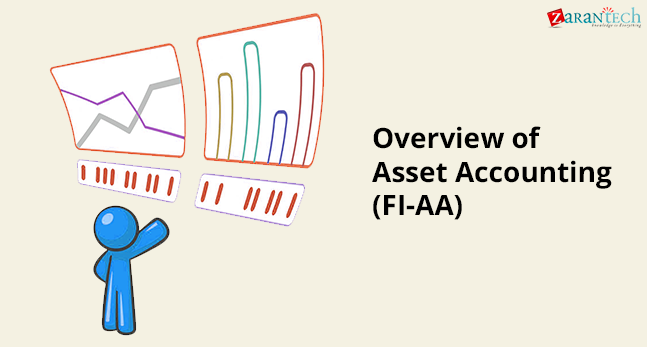Who can take up SAP New Asset Accounting Training?
Category: SAP New Asset Accounting Posted:Feb 24, 2017 By: Ashley Morrison
SAP S/4HANA Finance or SAP Simple Finance comes with abundant features like Streamlined Design, Universal Journal as well as real-time analytics. After the foundation of SAP (System, Application and Product) in Data Processing in 1972, it has praised huge credit over the years. Financial Accounting and Management Accounting in SAP support finance as well as account professionals to move forward in their career with better processes.
The FI-AA (Asset Accounting) module is an example of the financial module, which has been reformed in the SAP Simple Finance suite to enhance process competencies across an asset’s life cycle. New Asset Accounting is utilized to supervise and manage fixed assets by using the SAP Unit. It is widely accessed worldwide across enterprises. Those who want to set their career in the field of Finance needs to learn about the Asset Accounting. With the emergence of several numbers of training centers across the world, it is now possible to attain enough confidence on the Asset Accounting.
New Asset Accounting Training is a ‘must have’ thing for everyone who likes to shine in the domain of SAP Financial Accounting. Here in this article, we are going to gain useful details on who can have SAP New Asset Accounting Training.
Before diving deeper into the Asset Accounting training, it is vital to get an idea about the Asset Accounting.
Learn SAP New Asset Accounting from Industry Experts
Overview of Asset Accounting (FI-AA)

SAP Asset Accounting covers the entire asset lifecycle that begins when the buying order is formed or during the capitalization of asset and it continues to the retirement of the asset at the end. At this time, the system evaluates suitable depreciation values as well as interest amounts and offers this detail in various reports.
SAP New Asset Accounting is utilized for monitoring and managing fixed assets. When it comes to Financial Accounting, Asset Accounting functions as the subsidiary record (ledger) to the general record (ledger), offering detailed evidence of transactions that are involved in fixed assets. It is one among the most important concept to learn in the SAP System. Are you one among the professional who is looking for SAP FI/CO certification? Then, you should understand the Asset Accounting concept with strong understanding.
The following are some of the components in the Asset Accounting:
- Processing Leased Assets – This component includes the independent functions, which are assigned to rented assets as well as assets those are under-processing.
- Traditional Asset Accounting – This is one of the notable Asset Accounting Components. This component captivates the whole life cycle of the Asset. In this component, everything (ranging from asset purchasing to the asset retirement) is measured in conventional Asset Accounting.
- Information System – This logistic information system comes with a wide range of information systems like purchasing information system, sales information system, retail information system, plant maintenance info system, inventory controlling and so on.
- Consolidation Preparation – The consolidation preparation contains various sub-apps in consolidation like consolidation of business regions, consolidation of organizations, consolidation of profit hubs and consolidation of business components within an organization and so on.
Features of New Asset Accounting
- It is based on the universal journal
- It allows to assign the depreciation to the accounting principle
- With the compatibility views, it is possible to have previous year reporting after migration to the new Asset Accounting
- In Asset Accounting, it is possible to segregate in the order of depreciation asset and accumulated depreciation. However, it’s not possible in the classic asset accounting
- Allows having simplified depreciation charts. For single valuation, one depreciation area is essential and no delta depreciation parts needed for parallel evaluation. However, it is now possible in the traditional asset accounting
View all SAP New Asset Accounting Videos
Advantages of New Asset Accounting
- To have different periods posting. However, keep in mind that the starting and end of the FY want to be equal
- Offer new transactions for the principle of accounting
- Main advantage of Asset Accounting is that the system always posts the discrete documents for each accounting principle
- Conventional asset tables such as ANEP. ANEK, ANLC, ANEA and ANLP now substituted with ACDOCA. In addition, the ANEK table data are substituted with BKPF. ACDOCA is referred as a “Universal Journal Table”.
- In the SAP Asset Accounting, the technical clearing account acts, as a “Zero Balance Clearing Account” and it’s an offsetting account.
SAP New Asset Accounting Training
The training course of SAP New Asset Accounting focuses mainly on handling FI-AA master data. In addition, it concentrates on managing the various ranges of business approaches in FI-AA. This training course also covers the topics like:
- Periodic Processing
- Standard Reporting
- Evaluation and Depreciation
The training allows the participants to learn something about the organizational assemblies in the New Asset Accounting and FI. Since FI-AA is referred as the sub-ledger of FI. Participants are also allowed to configure FI-AA in personalizing in order to learn how different configuration potentials can influence the business processes and the application.
Regardless of whether you are a fresher, a developer or a consultant, you have to aware how the Finance System of SAP functions. It is vital for you to learn some essential things about Finance System.
The following are some of the concepts that a SAP professional should learn.
- How SAP Financial Accounting Works
- The fundamentals of Financial Accounting of SAP
- The prominence of the General Ledger
- The General Ledger Features
- How the modules of finance combine with other SAP modules
- Recognize the R/3 organizational elements and its basic settings
- Opening as well as closing Posting Periods
- Assign posting authentication to users
- How to classify as well as reconcile R/3 documents along with the unique documents
Who Can Take Up SAP New Asset Accounting Training?

Having SAP New Asset Accounting training is vital for those who are in the field of Finance. Here are some of the professionals who are treated as the target audience of the Asset Accounting Training.
- The graduates who include fundamental knowledge of finance as well as financial terminology and willing to learn FICO.
- SAP Technical Consultants who want a basic understanding of FI
- SAP Developers who like to learn FI
- SAP Functional Consultants who require a basic knowledge of FI
- Application Consultants who want to gain experience in FI
- Project Manager who develops projects in Finance
- IT Support who involved in the Finance projects
- Power Users who want to gain knowledge in FI
Why Professionals need to learn SAP Asset Accounting?
In order to know why various SAP FICO users (Power users, Consultants, Project Managers, and Developers) required learning Asset Accounting, it would be better to understand the job description of these professionals.
Generally, the SAP Finance job is categorized into the following groups:
- Power Users (Accountants)
- Consultants (Technical Consultants, Functional Consultants)
- Developers
- Project Managers
Job Description of Power Users (Accountants)
If you want to start your career in the SAP domain, it is suggested to remain in the power user position to gain more experience and knowledge of the procedures from the user perspective. Once you gain enough experience, you can move to the position of Junior Analyst or Junior Consultant.
Since the power users or accountants are in need to deal with following responsibilities, they are showing interest in enroling SAP New Asset Accounting:
- P & L (Profit & Loss) Analysis
- Financial Statements Preparation
- Reviews and reconciliations of balance sheet accounts
- Month-end closing processes
- CC (Cost Center) and GL (General Ledger) master data management
- SCM (Supply Chain Management) reporting
- PPV (Purchase Price Valuation) analysis
- Audits
- Quarterly reporting
- Support of Liaison
- Possesses knowledge of the FICO modules to the certain extent to suggest process enhancements
- Annual budget preparation, & participation
- Preparation of State / Federal Income tax return declarations
Job Description of SAP FICO Consultants
SAP FICO Consultants can be either external or in-house. Generally, in-house consultants function for the organization at the time of implementation and go-live periods. Eternal consultants function only with the implementation team.
These consultants play an important role when compared to the power users in the organizations since they’re responsible for the system configuration as well as implementation depending on the business requirements, improving processes, GAAP analysis and observing for new products/opportunities. Becoming a functional or technical consultant is a huge step in the career. They need to have at least 2 to 5 years of experience in SAP FI as well as CO modules including AP (Accounts Payable), CPA (Cost & Profit Center Accounting), AR (Accounts Receivable) and Internal Orders. The consultants are the major participants of the Assets Accounts in SAP; since, they need to fulfill the following responsibilities in the organization.
- Config of SAP FI and CO modules
- Observing for enhanced opportunities in the business units
- Implementing SAP BW (Business Warehouse)
- Application support and training of users
- Supporting in the testing process to identify issues and errors in documentation, business processes or user’s absence of experience
- Working with other SAP modules likes PP, MM PS and PM
Job Description of a Project Manager
The SAP FICO Project Manager is also known as a director or team leader. Project Manager is the important person when it comes to the project implementation. He should possess an extensive expertise and knowledge as an FICO consultant. He had also functioned in the sales process; hence, he should possess strong management and negotiation skills as well.
The following responsibilities induce the Project Managers to enroll SAP Asset Accountant training:
- Handling client relationships
- Coaching and supervising junior consultants
- Handling consultant team to deliver the final solution to the customer-based contracts
Qualification for Participants to have Asset Accounting Training

Here is set of qualification that supports the participants to learn training program more efficiently:
- Preferred to have graduated in Accounting and Finance or having experience with the SAP serviceable area
- Working as an SAP Asset Accounting professional on an SAP implementation project in any organization
- Experience in Implementing AA (Fixed Asset) module
- Accounting Fixed Asset Rules
- Experience in Asset Procurement Process
- Experience in Investment Handling
- Knowledge of combining Fixed Asset with Project Systems
- Knowledge in handling the budget for capital expenses
- Management of AA in SAP ranging from revaluation, acquisition, transfers, depreciation to the sale/retirement/scrapping
- Knowledge in migrating AA from SAP system to non-SAP system
- Knowledge in documentation, requirement gathering, implementation, configuration and testing the functionality of the assigned area
- Knowledge of Asset procurement strategies
- Strong communication skills
Advantages of SAP New Asset Accounting Training
The design and solution of the trained Asset Accountant will have a notable influence on the enterprise. The enhancement of the Asset Accounting knowledge will enhance the efficiency of the EAM process. The quality skills will support to enhance the production process quality. The candidate can able to coordinate and function as an Asset Accounting functional proficient. He can support as the IT applicant in his field of responsibility like Business Integration and EAM (Enterprise Asset Management).
The training program helps the candidate to apply their knowledge of Asset Accounting business Process needs and system technology for designing and deploying enhanced business processes. He can able to offer technical solutions in the provision of strategic initiatives. He can work closely with the developers’ team and perform a major task in the entire delivery of the allocated custom interface.
Conclusion
The main aim of the Asset Accounting training program is to make the participants master in managing FI-AA business Processes. If you want to gain knowledge on essential that are listed in this post, then take a training program in the reputed training center.
You May also like to read: How Ready Are You for SAP S/4HANA?

 99999999 (Toll Free)
99999999 (Toll Free)  +91 9999999
+91 9999999